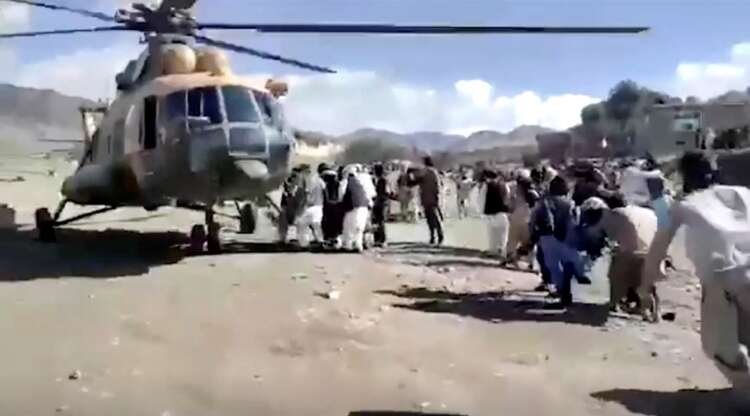Aid trickles in to Afghan earthquake zone, toll at 1,000 dead


By Mohammad Yunus Yawar and Sayed Hassib
GAYAN, Afghanistan (Reuters) -Aid began arriving on Thursday in a remote part of Afghanistan where an earthquake killed 1,000 people but poor communications and a lack of proper roads are hampering relief efforts in a country already grappling with a humanitarian crisis.
The magnitude 6.1 earthquake struck early on Wednesday about 160 km, (100 miles) southeast of Kabul, in arid mountains dotted with small settlements near the border with Pakistan.
“We can’t reach the area, the networks are too weak, we trying to get updates,” Mohammad Ismail Muawiyah, a spokesman for the top Taliban military commander in hardest-hit Paktika province, told Reuters, referring to telephone networks.
The earthquake killed some 1,000 people and injured 1,500 injured, he said. More than 3,000 houses were destroyed.
The toll makes its Afghanistan’s deadliest earthquake in two decades, according to U.S. government data.
About 1,000 people had been rescued from various affected areas by Thursday morning, Sharafat Zaman, a spokesperson for the health ministry told Reuters.
“Aid has arrived to the area and it is continuing but more is needed,” he said.
The town of Gayan, close to the epicentre, sustained significant damage with most of its mud-walled buildings damaged or completely collapsed, a Reuters team said.
The town, with only the most basic roads, was bustling with Taliban soldiers and ambulances as a helicopter bringing in relief supplies landed nearby, whipping up huge swirls of dust. About 300 people sat on the ground waiting for supplies.
‘UNPRECEDENTED CRISIS’
The rescue operation will be a major test for the hard-line Islamist Taliban, who took over last August as U.S.-led international forces withdrew after two decades of war.
The humanitarian situation had deteriorated alarmingly since the Taliban takeover, aid officials say, with the country cut off from much international assistance because of sanctions.
Afghanistan’s economy has all but collapsed, U.N. Secretary-General Antonio Guterres said in an appeal to aid donors in late March.
Drought has undermined food production and 9 million Afghans face famine. Some families have been forced to selling children and organs to survive, he said.
The United Nations said its World Food Programme (WFP) was sending food and logistics equipment to affected areas, with the aim of initially supporting 3,000 households.
“The Afghan people are already facing an unprecedented crisis following decades of conflict, severe drought and an economic downturn,” said Gordon Craig, WFP deputy country director in Afghanistan.
“The earthquake will only add to the already massive humanitarian needs they endure daily.”
Japan and South Korea both said they also plan to send aid.
Large parts of South Asia are seismically active because a tectonic plate known as the Indian plate is pushing north into the Eurasian plate.
In 2015, an earthquake struck the remote Afghan northeast, killing several hundred people in Afghanistan and nearby northern Pakistan.
(Reporting by Sayed Hassib in Gayan and Mohammad Yunus Yawar in KabulAdditional reporting by Emma Farge in GenevaWriting by Alasdair Pal; Editing by Robert Birsel)
Humanitarian aid refers to assistance provided to people in need, particularly during crises such as natural disasters, wars, or famines, aimed at saving lives and alleviating suffering.
Disaster management involves the planning and coordination of efforts to prepare for, respond to, and recover from disasters, ensuring effective use of resources and minimizing impact on affected populations.
International assistance refers to support provided by countries or organizations to help other nations in need, often in the form of financial aid, supplies, or expertise during crises.
Explore more articles in the Top Stories category











